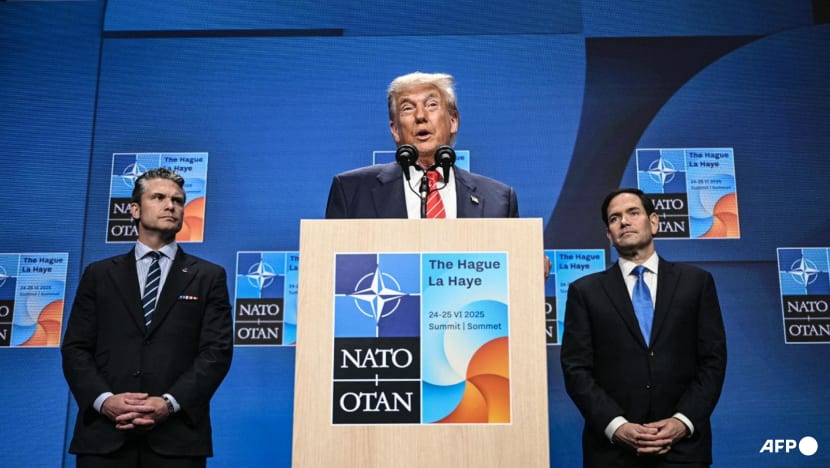Trump reassures allies as NATO agrees to 'historic' spending hike

US President Donald Trump (centre) speaks flanked by US Defense Secretary Pete Hegseth (left) and US Secretary of State Marco Rubio at a press conference during a North Atlantic Treaty Organization (NATO) Heads of State and Government summit in The Hague on Jun 25, 2025. (Photo: AFP/Brendan Smialowski)
THE HAGUE: United States President Donald Trump took a victory lap at NATO's Hague summit on Wednesday (Jun 25), joining leaders in reaffirming the "ironclad" commitment to protect each other after allies agreed to his demand to ramp up defence spending.
The unpredictable US leader appeared keen to take the plaudits as he secured a key foreign policy win by getting NATO's 32 countries to agree to meet his headline target of 5 per cent of gross domestic product on defence spending.
In a move that will provide reassurance to European allies worried about the threat from Russia, Trump signed off on a final leaders' declaration confirming "our ironclad commitment" to NATO's collective defence pledge that an attack on one is an attack on all.
"It's a great victory for everybody, I think, and we will be equalised," Trump said of the new spending commitment, ahead of the summit's main session.
Diplomats said that behind closed doors, Trump insisted there was no greater ally than Washington and urged others to spend some of the new money on US weaponry.
The deal hatched by NATO is a compromise that allows Trump to claim triumph, while in reality providing wiggle room for cash-strapped governments in Europe.
It sees countries promise to dedicate 3.5 per cent of GDP to core military spending by 2035, and a further 1.5 per cent to broader security-related areas such as infrastructure.
Entering the meeting, leaders lined up to declare the summit's spending hike as "historic".
NATO allies say the increase is needed to counter a growing threat from Russia but also to keep Trump engaged, with the US leader long complaining that Europe spends too little on its own defence.
Belgian Prime Minister Bart De Wever said: "As Europeans, we should realise that our long break from history is over."
The continent needed to take responsibility for its own security "in a very difficult time", added De Wever.
"TOTALLY COMMITTED"
Everything was carefully choreographed at the gathering in The Hague to keep the volatile US president on board: from chopping back the official part of the meeting to putting him up overnight in the royal palace.
Trump rattled his allies by appearing to cast some doubt on the validity of NATO's mutual defence clause, known as Article Five of the alliance treaty, telling reporters on the way to The Hague that it "depends on your definition".
"There's numerous definitions of Article Five," he said.
But Rutte insisted Trump remained "totally committed" to the pledge - which was reaffirmed unequivocally in the summit's final statement.
Underpinning the leaders' discussions on defence was Moscow's invasion of Ukraine, and in another sop to the demands of allies, the US allowed NATO to refer to the "long-term threat posed by Russia to Euro-Atlantic security" in the communique.
Though its language was watered down from previous years, the declaration also said allies would continue to support Ukraine, "whose security contributes to ours", and could use money from the new spending pledge to fund military aid for Kyiv.
"NICE GUY"
That came as Trump was poised to meet the war-torn country's president, Volodymyr Zelenskyy, on the summit sidelines.
Zelenskyy is playing a less central role here than at previous summits, to avoid a bust-up with Trump after their infamous Oval Office shouting match.
But Trump described him as a "nice guy" and added that he was talking to Russian President Vladimir Putin about the war, saying: "I think progress is being made."
But despite Rutte's insistence that Ukraine's bid for membership remains "irreversible", NATO's statement avoided any mention of Kyiv's push to join after Trump ruled it out.
Hungary's Kremlin-friendly Prime Minister Viktor Orban was more categorical.
"NATO has no business in Ukraine," he said. "My job is to keep it as it is."















